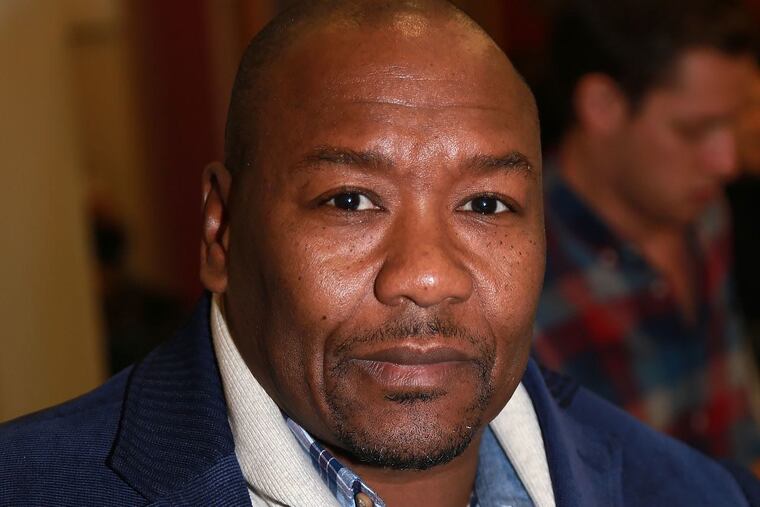I was exonerated and proved innocent. It could have been me facing COVID-19 in prison. | Opinion
Two New Jersey bills could save the lives of people like me.

In 1992, at the age of 28, I was accused of murdering a man and was sent to prison for that murder. Do you still want to keep reading? Do you think differently of me?
I was freed in November 2015 when the single witness who testified against me — the victim’s girlfriend — was found to be “unreliable, untruthful and incredible.” It turned out she had been coerced by Louis Scarcella, an acclaimed New York City homicide detective, whose 50 murder convictions were called into question when his sketchy investigatory tactics were revealed by the Brooklyn district attorney’s Conviction Integrity Unit, compromising the legitimacy of those convictions — including mine. Do you still want to keep reading? Do you think differently of me?
I know what it’s like to come home and have nothing. I know what it is like to be treated like nothing in the hands of the criminal “justice” system and to be treated like less than nothing while locked up. And I know that this current framework must end, and now is the moment.
As the COVID-19 pandemic continues to rage on, New Jersey has held the distinct dishonor of being the state with the highest rate of deaths in prisons due to the coronavirus. As the rest of the nation embarks on an unprecedented trajectory, and more prisons experience the crisis New Jersey has, every state will wrestle with this problem. New Jersey has a chance to do the right thing.
Gov. Phil Murphy has the ability to commute sentences, but he hasn’t. While the governor has given prisoners the right to a medical furlough or parole, and the New Jersey Supreme Court has created a legal framework to allow incarcerated people the right to appeal a denial, people incarcerated in New Jersey’s prisons continue to sicken, and, in some cases, they will die, as many already have. The death toll also extends to the staff — civilian and correctional alike, as well as the families they go home to.
New Jersey’s SB 2519 and AB 4235, introduced by State Sen. Nellie Pou, Assemblyman Raj Mukherji, and Assemblywoman Shavonda Sumter, creates a public health emergency credit, expediting release for people due to complete their sentences within a year. The credits will reduce sentences by four months for each month of the declared state of emergency during the pandemic, with a maximum sentence reduction of eight months. The legislation will apply to adults and kids, with an exception for people determined to be compulsive and repetitive sex offenders in need of treatment.
The COVID-19 crisis has shown us how seriously the state takes its self-appointed task of fortifying the walls that determine how far in we cannot see, allowing people to die as we whistle past the prison gates. Right now, in this moment, we are willing to allow people to die to avoid acknowledging the effects that ruthless policing and generations of social deprivations have wrought.
As someone who worked with men accused of all types of crimes, I saw firsthand how often the system got it wrong, as a constitutional matter and as a matter of truth. I watched as desperately sick men were failed by overwhelmed prison hospitals, and given Tylenol to address serious conditions, from cancerous tumors to bowel obstructions. Now I watch as the deaths climb, as ill people overwhelm hospitals in locations close to prisons, threatening the lives of communities inside and out.
COVID has revealed that we are not deemed worthy of this world, even with the virus roaring at our backs. Our families are told they do not deserve their fathers, daughters, uncles, brothers, and wives. That it is acceptable for people to die.
I saw this same indifference in the casual dispensation of solitary. I saw it in case after case as a jailhouse lawyer. Still, even in the face of death, we see the same tired arguments: that even with a deadly virus exploding in the Petri dish of our prisons, where spread is assured, incarcerated people do not deserve to be treated with the basic dignity accorded to any human being.
I was in for murder, a murder that I did not commit, with incontrovertible evidence proving my innocence. If I were still in, my life could have ended in prison, waiting to be exonerated for a crime I did not commit, clearly an injustice. Yet, is it in any way “just” to let an elderly man who did commit murder, and has served 50 years, die?
You must think differently of me — our society depends on it. That also goes for the men and women who are suffering in our prisons, waiting in fear for possible symptoms of a deadly virus. We have to find our own humanity in understanding theirs.
Derrick Hamilton is an activist for reform of the criminal legal system and advocates on behalf of those affected by it. He served for 23 years in prison, where he was a jailhouse lawyer, before his exoneration and release. A version of this piece also appeared in the Star-Ledger.